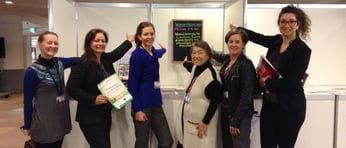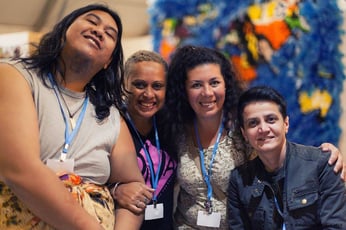Advocacy in Action
Apr 10, 2015

NEW YORK (April 10, 2015)- The Women’s Major Group had a strong showing with representatives from across the globe who made impacts and inroads at the WCDRR in Sendai, from 13-18 March 2015. Activities included ongoing advocacy with Member States, official statements (watch Hiroko Hara of Japan Women’s Network for DRR), daily messages, speaking roles in […]
NEW YORK (April 10, 2015)- The Women’s Major Group had a strong showing with representatives from across the globe who made impacts and inroads at the WCDRR in Sendai, from 13-18 March 2015.
Activities included ongoing advocacy with Member States, official statements (watch Hiroko Hara of Japan Women’s Network for DRR), daily messages, speaking roles in dialogues (watch Adivasu Levu of FemLINKPACIFIC at Women’s Leadership Dialogue) and at the Ignite Stage, side events, press conferences (watch WEDO’s Eleanor Blomstrom), informational booths and more. While the WMG itself took form in early 2014, a majority of the members of the WMG are experts, advocates and practitioners who have worked with Disaster Risk Reduction for years and even decades, ensuring women’s rights and gender equality are part of DRR planning, research and actions.
The Sendai Framework for Disaster Risk Reduction and the Declaration were agreed on March 18, 2015, after a marathon of over 30 hours of negotiations beginning 17 March at 10am, all of which followed a late night on the 16th. Most of the final discussion took place in small informal informals behind closed doors. Meanwhile, the majority of delegations and all the observers waited in the plenary room. One delegation tried to brighten the mood and inspire progress by handing out roses throughout the room, but as time dragged on the beautiful roses started to resemble the delegates – wilted and bedraggled.
The text
The agreement, which takes the place of the Hyogo Framework for Action, has a timeline of fifteen years. Text on women, women’s rights and gender equality remained fairly weak up through the final document (compilation of women/gender text is available here): women’s leadership is included as are gender sensitive policies and a reference to sexual and reproductive health care services. However, women are often included together with girls and marginalized groups, furthering the ‘victim’ paradigm; the term ‘gender equality’ does not appear in the text, nor is there a reference to women’s human rights; the WMG advocated for stronger language around gender-responsive policies, and the gender-sensitive policies are only referenced in relation to the Major Groups, which shifts the burden to civil society and especially to women. The private sector was included in all sections of the text but there was no correlating text for private sector accountability or regulation. The long deliberations by Member States on the stickiest issues, such as means of implementation, especially technology transfer and whether it should include ‘mutually agreed terms’ as advocated by the US, especially; CBDR and climate change; conflict; and financing, overshadowed the critical need for comprehensive DRR that changes systems and sets in place preparation and prevention to build resilience. All of this was happening alongside a furious category 5 storm in Vanuatu.
Women taking action
As the WMG stated in the final civil society press conference, women have not been and will not be idle. Organizations are already leading on capacity building projects around gender and DRR, reconstruction projects, and more. We will use the text to the fullest possible, and go farther wherever possible. We will also follow through on DRR in all the 2015 agreements to come this year.
See the WCDRR site for many further links and the Earth Negotiations Bulletin by IISD for a great summary.
WMG @ WCDRR Message of the Day:
Participation by WMG members in numerous events:
Resources

Support Our Work
Your donation provides us with the stable foundation we need to build the feminist future we’re working to realize.
Donate Today